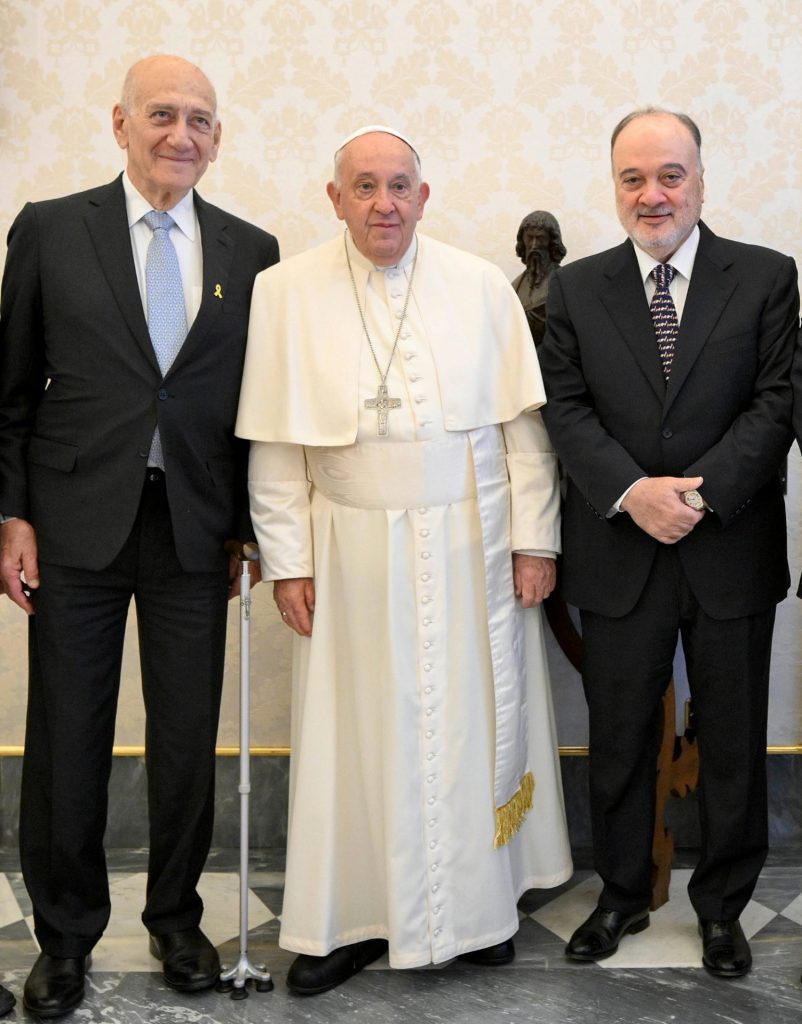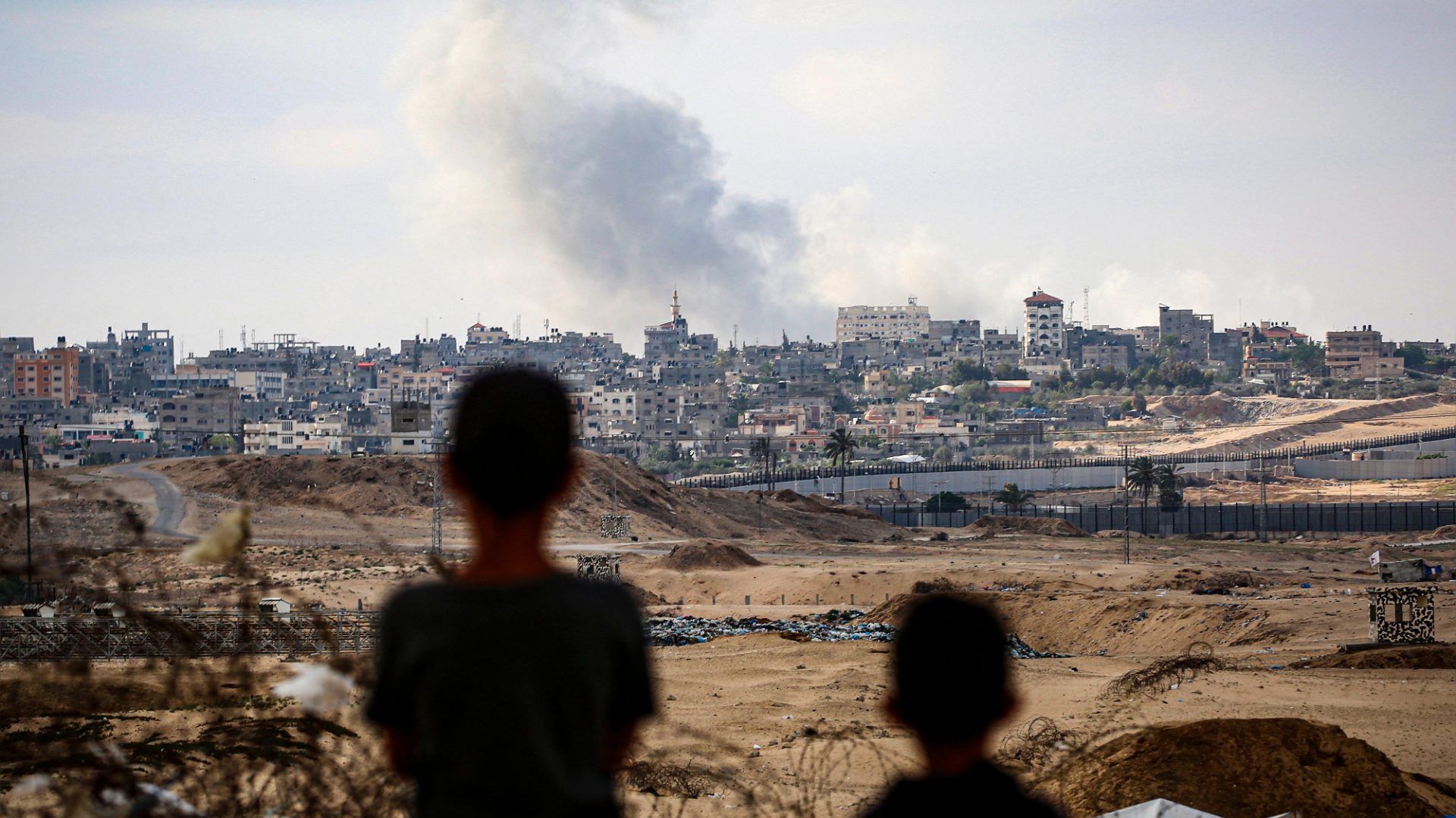Two elder statesmen of Israeli and Palestinian politics have joined forces to promote a peace plan that they believe is the only solution for bringing an end to the horrific war that began with the October 7 Hamas massacre of 1,200 Israelis and has killed thousands of Palestinian civilians.
For Ehud Olmert, a former prime minister of Israel, and Nasser Alkidwa, a Palestinian diplomat and nephew of the late Palestinian president Yasser Arafat, peace begins with a ceasefire and the release of Israeli hostages still held by Hamas.
Their plan includes capitals for each side in Jerusalem, and an international security force that would work with the Israeli military. Land swaps would account for Israeli settlements; a technocratic Palestinian governing structure would be linked to the Palestinian Authority; and elections would be held in Gaza and the West Bank within three years.
The Olmert-Alkidwa plan is based on the 1967 borders, which Olmert had proposed during his 2006-09 premiership. The pair have known of each other for many years and met to refine this proposal just a few months ago.
Since July, they have been promoting it globally as the only route to peace, not just between Israelis and Palestinians, but, as violence has threatened to engulf the region, for the Middle East as a whole.
They have found traction abroad, among leaders, thinkers and policy makers in Europe and the United States. The pending second term of Donald Trump presents a layer of unpredictability, but has not clouded their optimism that the plan will find support in Washington.
As president of “the most powerful state in the universe,” Trump “will have a large impact on the overall situation. At this stage, I think we cannot predict what’s going to happen,” said Alkidwa.
“We will try to work with his team and to see how we can push things forward. But at the end of the day, of course, it will depend on him. We’ll definitely depend on him, because I don’t think that we can do it by ourselves. We will need the support of the American president and the new administration,” he said.
After meeting with Alkidwa in early September, the European Union’s foreign policy chief, Josep Borrell, tweeted: “Dialogue and compromise are the only way forward to break the current deadlock and achieve lasting peace and security for two states, Israel and Palestine.”
The Pope, too, showed what Olmert described as “extraordinary attention” during a half-hour meeting at the Vatican on October 17.
The hardest sell, the two men acknowledged during an interview with the New European, will be to the Israeli and Palestinian people, who appear clenched in a downward spiral of bitter retribution that is polarising their societies, and entrenching mutual distrust.

Olmert said that the ceasefire between Israel and Hezbollah, the Iran-backed Lebanese terrorist group that has been raining missiles on northern Israel for more than a year, was at least a starting point for the peace that he and Alkidwa planned.
The two-month US-brokered ceasefire, which took effect on November 27, “is the right thing at this point,” Olmert said.
“We should have made this agreement long before. I thought that the ground operation was unnecessary. If at the end we will have an agreement, that will have to be the guarantee for any future attempts by Hezbollah to penetrate into the south of Lebanon.
“But in any event, the fact that the war in the north seems to be stopped now is good. The main thing is to stop the war in Gaza.”
Yet amid the profound pessimism pervading both sides, the two men retain hope that one day, if not soon, their plan will take hold. Alkidwa is reckoning on three years of negotiations to hammer out the details – once the war in Gaza has ended.
“It will become the reality,” Olmert said at his Tel Aviv office, which is dominated by photographs of “my good friend”, former US president George W Bush. In one, blown up to almost lifesize, they are standing back-to-back, to see, Olmert said, who was taller (Olmert, by a short centimetre).
“The problem is that at the present time, while so many know that there can be no alternative, the general attitude, particularly here [in Israel]
as a result of what happened on October 7, is disposed to be against it,” Olmert said.
“Therefore, we have to try to influence the attitudes, and try to explain to the average person that we can be obsessed forever with the fears of the past and lose the opportunity to change realities so that the future will be different.
“How can we, at the end of the day, move from where we are to an entirely different reality?”
The October 7 2023 attack on Israel by Hamas terrorists was shocking in its butchery. Many of those killed were attending a music festival. Hamas took 251 hostages, among them women, children and elderly people. Around 80 have been released, and 50 are believed to have died – executed by their captors, killed by Israeli airstrikes on Hamas positions, or from lack of treatment for their injuries.
Israel is plastered with posters of the hostages. Many Israelis wear yellow ribbons, or pendants with the ubiquitous message to “Bring Them Home Now”. The attack is ever present, the trauma and anger deep.
Many people will say openly that the violence being rained on Gaza is only what is deserved. The people of Gaza voted for Hamas, they say. Gazans support Hamas and so they are no different to the terrorists.
Individuals in Gaza, especially the women, could have acted unilaterally to return the hostages. Israeli assaults on Gaza are more than justified, they are essential to Israel’s security and survival. Any suggestion of genocide is dismissed.
Benyamin Netanyahu, the democratically elected prime minister, is a polarising figure. His popularity took a hit in the aftermath of the massacre, though it has bounced back in recent months.
His belligerence retains the backing of right wing parties and voters; moderate Israelis regard Netanyahu as motivated by his own survival, as he faces trial on corruption charges that could land him in prison, an odd parallel to Trump, who as president will not now face sentencing after being found guilty in a New York court of corruption. (Olmert himself was jailed in 2016 after being convicted on corruption charges)
Like many Israelis, writer and commentator Ori Goldberg sees Netanyahu doing the country a disservice. As they watch more and more people leave, moderates fear that Netanyahu’s far right – read anti-Palestinian – supporters will gain strength, and the hostilities will be endless.
Goldberg said he has come to believe the bombardment of Gaza constitutes a genocide. What other conclusion could there be, he said, as Netanyahu’s goal of eliminating Hamas has been achieved, yet the killing of Palestinians continues.
“What made me decide this is the growing awareness that Israel is killing Palestinians for practically no purpose,” Goldberg said.
“Netanyahu thinks that Palestinian life is so worthless in Israeli eyes that he ends it at an industrial rate. Israeli security has not been improved, there is no existential threat. Yet every day, dozens more Palestinians die,” he said.
Likening Israel to Yeats’s rough beast, slouching towards Bethlehem to be born, he said: “We want to be remade as the only country in the world that can act with absolute discretion, the ahistorical trauma of the Jewish people equals impunity. But impunity is wrong.
“Israel needs to lose this demand for impunity. Palestinians need to look into the horror of Gaza and figure stuff out. The collective morality, or lack thereof, has been exposed,” he said.
Olmert does not consider the pounding of the strip or the daily killing of Palestinians as, technically, a genocide. “Genocide is when you have a plan to kill them, when you are prepared from the outset to kill them because you want to kill them. This has never happened and no one will be able to accuse Israel of doing it,” he said.
“That doesn’t mean that the way it was handled, that the strategy and actual performance of the Israeli government is of any merit. It’s not. We have to get rid of this government as soon as we can.”
Olmert said that Netanyahu’s goal of “total victory” has been achieved and a ceasefire is overdue. “There is no Hamas, OK, Hamas disappeared from the face of the earth,” he said.
“Hey, there are still six million people, Palestinians. What are we doing with them? We want to continue to be occupiers of the Palestinians for ever? To deny them of the right to self-determination? To deny their rights of freedom of movement, to deny their rights to vote and elect their own leadership?
“How long can we carry on without losing the last support in the most remote corner of the world where everyone will be exposed against us. Where everyone is already now against us. How much further can we carry on?
“When they will stop servicing our planes coming to European airports or North American airports or Asian airports? When they will stop servicing our boats and ships when they’re coming to the harbours in Europe or in the Far East? And that Israel will be completely boycotted and separated and isolated in the whole world?” Olmert said. “Well, then we’ll understand that there must be something done in order to change it.”
Goldberg said a period of isolation might be the only way Israel could be forced to face the consequences of its actions. “It’s a black hole. Israel has gone rogue. Palestinians are so wronged and bloodied, survival is such a challenge, the strange death rains on their heads every day” he said.
“You’ve got to take a few years of not doing anything, to come up with the real numbers, to bury the dead, to get a grip on how annihilated Gaza really is, to organise a Gazan leadership, of Israel not dictating, of Israel being cast out, ostracised from the world, to ponder, to have the nerve endings be less exposed.
“Two to three years of pulling bodies out of the rubble, of Israel not carrying out offensives on neighbouring countries,” Goldberg said.
The Hamas-run Gazan health ministry puts the number of dead since October 7 at 44,056 and says half the dead are women and children. The figures cannot be verified.
Israel says 17,000 militants have been killed, a figure that is also unverifiable.
Much of the Gaza population of 2.3 million are displaced. Many thousands live in temporary camps without basic services. Food is scarce. Destruction from persistent bombardment is extensive, and many of the dead are lost in the rubble.
Around 60,000 people have been evacuated from Israel’s northern regions, to escape daily rocket fire from Lebanon’s Iran-backed Hezbollah militant group.
The International Criminal Court, on November 21, issued arrest warrants for Netanyahu, his former defence minister Yoav Gallant, and Hamas military leader Mohammad Deif for war crimes. Hamas has said Deif is likely dead.
US congressman Mike Waltz, Trump’s pick for national security adviser, responding to the warrants, signalled what’s to come. “You can expect a strong response to the antisemitic bias of the ICC and UN come January,” he said.
While an uneasy peace has settled elsewhere, Netanyahu’s government has also taken steps to ensure that jihadist groups in Syria do not use the power vacuum and chaos following the fall of the Assad regime to seize weapons that could be turned against Israel. More than 50 years of Assad family rule and Ba’ath Party dominance ended on December 8, after the rapid advance of forces led by Abu Mohammed al-Jawlani, the head of Hay’at Tahrir al-Sham (HTS), a Sunni Islamist group formerly linked with al-Qaida.
Israel escalated airstrikes targeting Iranian-backed militias and Hezbollah positions in Syria to prevent destabilisation near its borders. It moved to secure key territories, including buffer zones in the Golan Heights, as part of a strategic focus on containing threats while navigating the unpredictable aftermath of Assad’s fall.
For Olmert and Alkidwa, regardless of how tough Trump wants to be, their plan – which Goldberg described as a “game changer” – presents a political solution to a complex and seemingly intractable problem.
“It’s the position of the far right [Israeli] government to fragment the issues and to negotiate each fragment in a way to prove that it’s impossible to reach agreement,” said Alkidwa. “We are pushing for a comprehensive approach that will end the war but also will lead to an overall political solution. It has to start with the end of the war in Gaza,” he said.
“We feel that we are making progress, in spite of the noise of the artillery. We are making progress with the public as well as with governments. And if we succeed, that would be the best answer.”




